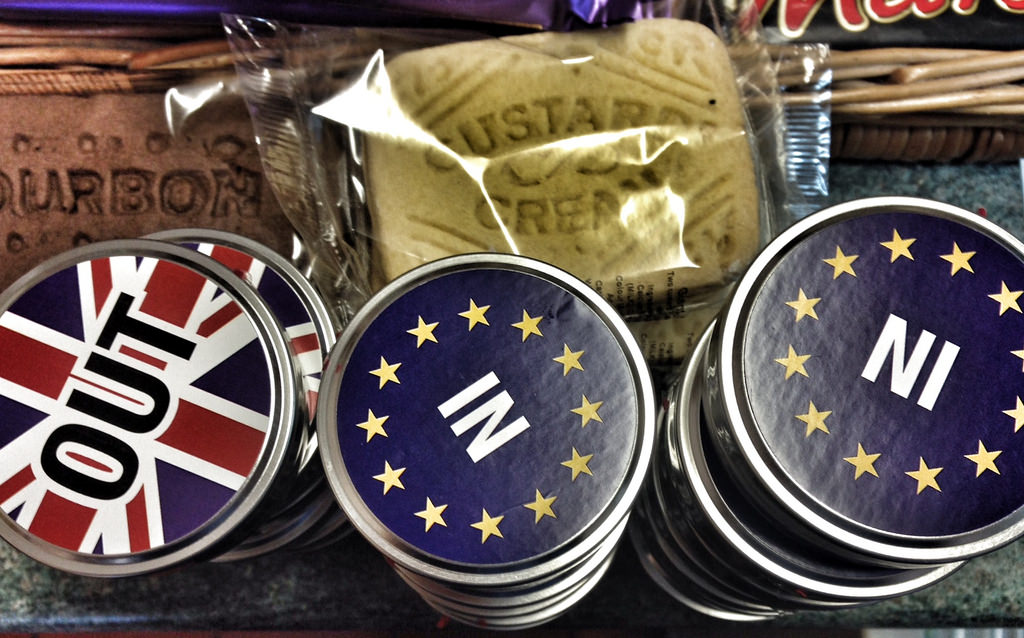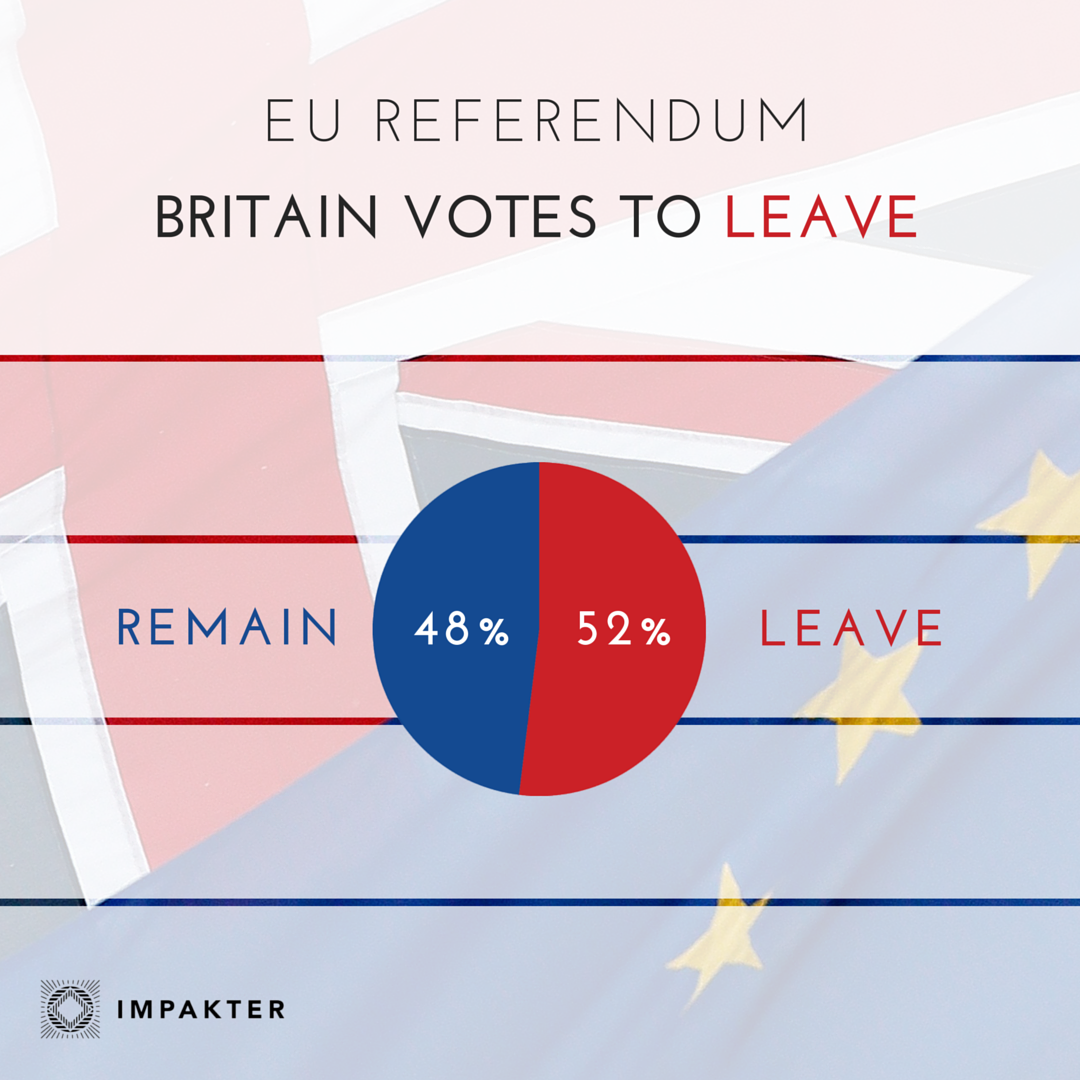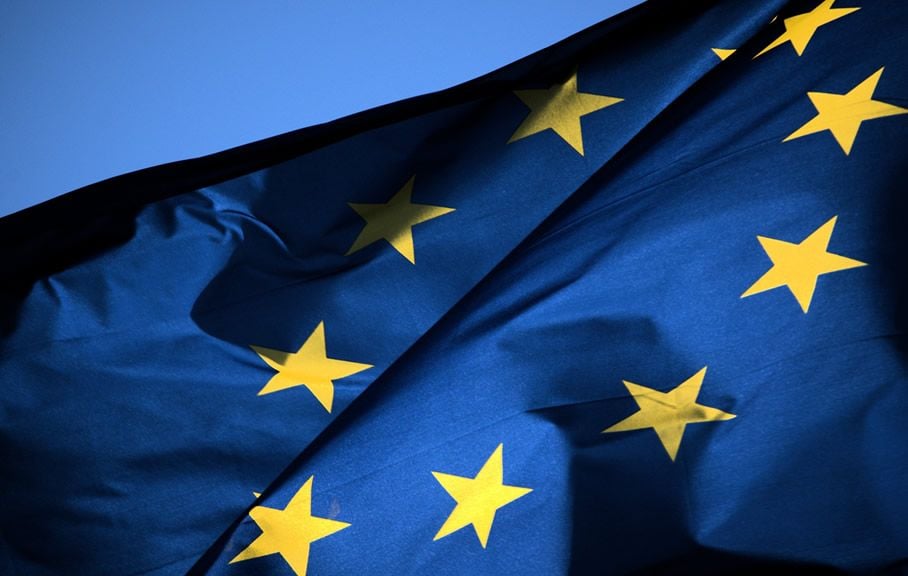By Claude Forthomme.

Note to our readers: This is a new kind of article, bringing you opinions and political views of influencers and politicians as events unfold.
Today, we are covering Brexit, the referendum calling on the British to vote for leaving or remaining in the European Union– the vote will go on until 10 pm today (local time). The article will be updated throughout the day and until tomorrow when results will be announced; we plan to provide comments and links to the more notable articles from all major news media, in real time, the most recent first, as they are uploaded onto Thingser – a social media platform dedicated to following trends and news, with members constantly uploading noteworthy articles and sharing them with like-minded friends. And here, the Impakter team will share those news as they develop with you – be sure to come back for our wrap-up note and assessment once the vote is known. For those interested, an in-depth analysis of Brexit, the pros and cons, was published on Impakter on 1 June, see here.

Wrap-Up Note: The Brexit Dream Likely to Turn into a Nightmare
While the vote on 23 June was carried out with quiet and dignity, as exit polls were (wisely) banned which contributed to the maintenance of order, the outcome is stunning: 52% for leaving the EU, over 17 million voters, against 15.9 million for the Remain camp.
UKIP’s secretary Nigel Farage exulted, ““Dare to dream that the dawn is breaking on an independent United Kingdom.” Unfortunately, that dream could quickly turn into a nightmare as the predictions of a deep economic downturn become real.
And the downturn has already started. Prime Minister Cameron immediately announced his resignation, opening up a government crisis in the UK.
Shock waves hit the EU as well. A quick reaction came from Martin Schulz, the president of the European Parliament, who said the assembly would hold an emergency session on Tuesday to address Brexit. The European Council President Donald Tusk also announced the 27 EU bloc is “determined to keep our unity” and will assess a course of action “to avoid a chain reaction” (as Martin Schulz put it) in a EU summit meeting next week – or at least on the margins of it, as he plans to schedule meetings with EU leaders without Prime Minister Cameron.
When markets opened in Asia on the morning after (24 June), stock prices plummeted, along with the British pound. In a way, this is surprising, financial markets are rarely wrong and they had bet on the Remain camp, yet, this time, they turned out to be quite wrong. Markets had, it seemed, not given sufficient weight to the emotions the Leave campaign had stirred up in the British population, playing on fears of immigration.
So, Brexit was in the cards and to the end it was a very close call, with the 52-48 ratio seemingly reversed at first, in the early hours after the polls had closed, in favor of Remain.
Yet, sadly, the murder last week of Jo Cox (41), mother of two, a Labour politician who strongly supported Remain, did not change the cards.
Immigration was the biggest ISSUE in the campaign
The biggest issue aside from xenophobia, nativism and even racism as we have seen from UKIP members. Objectively, with net migration to Britain of 330,000 people in 2015, more than half of them coming from the European Union, there was little Mr. Cameron could do. And, as argued again and again, while immigrants contributed more to the economy and to tax receipts than they cost, many Brits felt that their “national identity was under assault and that the influx was putting substantial pressure on schools, health care and housing.”
The real problem is that the European project, instead of being seen as a solution to war and poverty intended to ensure prosperity and security, is seen as a threat to “national identity”.
An extraordinary large number of people, about half the UK population, is unable to go beyond nationalism which for them, is a major psychological crutch shoring up their sense of belonging. Bottom line, over 13 million Brits feel they belong to Britain, not to Europe – and most of them are in England (85 million of the UK population is English), not Scotland or Northern Ireland. And that’s why you can expect independence movements in both place to have a second wind in their sails, as Scotland and Northern Ireland may very well opt out of the UK in order to stay inside the EU’s single market.
As the NYT Steven Erlanger put it, “The victory of the Leave campaign and Britain’s exit from the European Union risks making Britain a poorer place, if the pre-referendum economic forecasts prove true”.
The break-up is going to be messy.
How to leave the European Union is not easy, and the one article permitting it (article 50), leaves many moot points in the process, except for setting a clear deadline: 2 years from the moment a country officially requests to leave. In the meantime, nothing changes, everything stays in place as before the vote. So the first hurdle the British government will need to clear is when to ask the EU to leave – some in the Leave camp would like Cameron to delay the request in order to gain leeway in early “pre-leaving” negotiations with the EU.
This overlooks that the EU, especially France and Germany, will not be lenient on a country leaving, out of fear of a domino effect. They will want to make it very tough on the UK in order to deter others from leaving. And as Greece has learned at its expense, Germany can be very tough indeed.
And rightly so: Brexit resonates far beyond Britain. There is an astonishing number of people across Europe who think like the Brexit fans. In the latest Eurobarometer survey, covering all 28 EU member states, 45 percent of respondents said they think that the EU is going in the wrong direction, compared with only 23 percent who think the opposite. The European project has never been so shaky.
So what happens next?
The EU will hurt
“The main impact will be massive disorder in the E.U. system for the next two years,” said Thierry de Montbrial, founder and executive chairman of the French Institute of International Relations. “There will be huge political transition costs, on how to solve the British exit, and the risk of a domino effect or bank run from other countries that think of leaving.”
Domino effect or bank run risk: yes, especially with the new East European members, in particular Poland and Hungary – but also Austria. This will give a boost to rightist populist parties across the continent, in France, to Marine Le Pen’s Front National, in the Netherlands, to Geert Wilder’s Party for Freedom, in Germany to the Alternative for Germany.
Europe will have to “reorganize itself in a system of different degrees of association,” said Karl Kaiser, a Harvard professor and former director of the German Council on Foreign Relations. “Europe does have an interest in keeping Britain in the single market, if possible, and in an ad hoc security relationship.” Different degrees of association: yes, definitely. Expect – if all goes well and European politicians start acting as leaders rather than puppets – that the 19 members of the Eurozone could become the core of a new Europe. Former French President Sarkozy (who is thinking of going back into politics) has talked of setting up a European Monetary Fund and installing a European Finance Minister for the Euro.
But give the UK access in the single market? Probably not.
Cameron had promised he would ask for exit immediately after a vote showing that’s what the people wanted, but having announced he is resigning, he is effectively handing over that decision to his successor.
Britain is Isolated
While the EU is hurt – but still whole with 27 members -, Britain will now find that it is “dangerously isolated”. You can’t turn back the clock on globalization.
As a prescient article by Brookings Institute’s fellow Arturo Sarukhan warned, Brexit will have an effect even on America: it is “like manna from heaven for an isolationist and nationalist like presumptive Republican presidential nominee Donald Trump”. Also the treaty currently under negotiation, the Transatlantic Trade and Investment Partnership (TTIP) meant to open up trade between the US and Europe, is likely to hit the rocks without the UK’s participation.
On a political level, the US will soon find that the UK, its “special friend”, no longer has the clout it used to have now that it is out of the EU. And the US-UK long-standing special partnership could be seriously dented and possibly replaced by a US-Germany special relationship.
One may well wonder whether that is what even the most convinced British nationalist really wanted…Because the times when Britannia Rules the Waves are really over.
Final Views (24 June):
-
Prime Minister Cameron immediately announces his resignation: from the New York Times and British papers, see here A political crisis is Brexit’s first consequence on the UK.
-
In a historic vote, Britain votes to leave the European Union: from the New York Times, see here. With only a few towns left to report, the BBC “called the race for the Leave campaign shortly before 4:45 a.m. [local time], with 13.1 million votes having been counted in favor of leaving and 12.2 million in favor of remaining.”
-
With 38 results left to declare, Britain faces the real possibility of a Brexit as Leave has 51.8 percent of the votes counted so far: from the Guardian, see here. The pound has dropped to its lowest levels since 1985 and a selloff is predicted once the market opens. Japan’s Nikkei index has slumped 7 percent, this being its worst one-day fall since Fukushima was hit by an earthquake that resulted in a tsunami and a nuclear disaster.
-
333 results left to declare: from the BBC, see here. Leave has 50.3 percent of the vote so far. Brexit may seem closer than thought.
-
Close to two and a half hours after polls have closed, Sterling fell 2.8 percent (12:21 a.m. local time): from Bloomberg, see here. Earlier it had climbed above $1.50 for the first time since December after a YouGov survey.
Today’s views (23 June):
-
The first five districts have declared (of 382): from the Evening Standard, see here. Four districts have chosen to remain (Clackmannanshire, Orkney Islands, Newcastle, Gibraltar) while one, (Sunderland) has supported Brexit overwhelmingly.
-
Shortly after closing, early polls show Remain (barely) winning, a YouGov poll putting Remain at 52% vs. 48% and reassuring the markets: from Business Insider, see here. It is however too early to be sure (2 hours after closing time), when the markets open in Asia, more will be known…
-
Global stocks climb with “voting underway in the U.K.’s referendum on its membership in the European Union”: from Bloomberg, see here.
-
Polls suggest the debate is “neck-and-neck”: from the Telegraph, see here. The Ipsos MORI survey displays 52 percent advocating to remain in the E.U., against 48 per cent for a Brexit.
-
Earliest results not before 11 pm, local time: from the Wall Street Journal, see here.
-
Brexit referendum looks like the Scotland independence plebiscite, and Mr. Cameron has failed to learn the lessons from it, that “referendums settle nothing”: from the Financial Times, see here. Worries about the economy may be enough to let the Remain camp win, but FT’s Mure Dickie argues that “the most important lesson from Scotland, however, was the naivety of expecting a referendum to take the sting out of a long-running political debate.”
-
Phone polls suggest the result could go either way: from the Telegraph, see here. Since last year, phone polls suggest a nine per cent lead for Remain, while online polls have it at just one per cent. And now sitting at 51 to remain vs. 49 to leave (based on average of last 6 polls).
-
Global stocks rallied along with the British pound as referendum started: from the Wall Street Journal, see here. The financial world is sanguine, convinced the Remain camp will win.
-
Polls are open, a record 46,499,537 people are entitled to take part: from the BBC , see here.
Yesterday’s views (22 June):
-
European Commission President Jean Claude Junker says “out is out”, there will be no deal to renegotiate: from the Independent, see here. This is a blow to those Britons who hoped that negotiations would always be in the cards.
-
A UK vote to leave Europe would “shake the continent to its foundation”: from the Wall Street Journal, see here. No matter the outcome, the EU will never be the same again. The UK’s “effort to claw back power from Brussels” which is what Prime Minister Cameron did before calling for the referendum in February 2016, is an “approach that other European politicians are promising to follow, potentially fragmenting the bloc further”. Hungary’s Prime Minister Viktor Orban is particularly tempted – as are all the populist parties on the right, stirring fears of refugees – and Orban has called for a referendum on the EU’s migration in September. If the UK leaves, expect referendums for leaving the EU in both France (with Marine Le Pen’s National Front) and the Netherlands (with Geert Wilder’s Party for Freedom). On the other hand, former French President Sarkozy, who is seeking to return into politics, is pushing for strengthening the “core” of Europe, i.e. the 19 members using the Euro, the Eurozone, with setting up a European Monetary fund and a Eurozone finance minister. But deepening the EU federal features is not in the cards as both Germany and France have elections coming up and politicians fear a backlash from populists.
-
No matter the vote outcome, the EU needs to rethink itself: from the New York Times, see here. It must address its “democracy deficit”, something that has been noted for a long time yet nothing has been done.
-
Push to leave EU lost its steam in the last two days: from abc news, see here. The senseless murder of Labor member of Parliament Jo Cox by a deranged individual screaming “Britain first!” certainly contributed to this result. Whether this effect is permanent, we shall see today.



